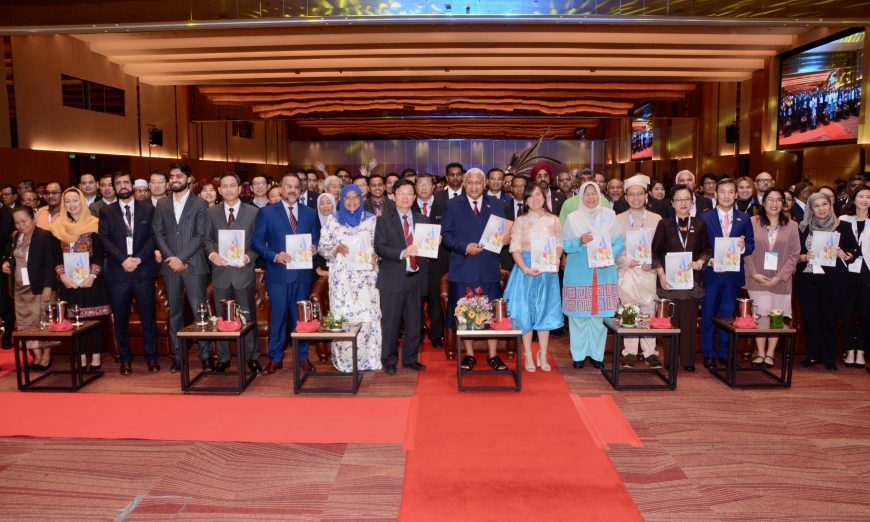THE need for a sustainable urban future is crucial considering that the Asia-Pacific region has become majority urban, United Nations Under-Secretary-General and United Nations Economic and Social Commission for Asia and the Pacific (ESCAP) executive secretary Armida Salsiah Alisjahbana said.
“Leaders of State and Government have committed themselves to implement and achieve the 17 Sustainable Development Goals (SDGs) by the year 2030 during the United Nations general assembly in September.
“The SDG Summit resulted in a call for a decade of action for sustainable development. Therefore, there is a need to accelerate the implementation of the SDGs.
“The Asia-Pacific population is now the largest, having about 4.3 billion people out of over 7 billion people in the world. The urban population in Asia-Pacific has also grown significantly.
“More than half of the population in our region live in urban areas or cities,” she said in her speech during the opening of the 7th Asia-Pacific Urban Forum (APUF-7) at Setia SPICE Convention Centre today.
Also present were state Housing and Local Government Minister Zuraida Kamaruddin and state Local Government, Housing, Town and Country Planning Committee chairman Jagdeep Singh Deo.
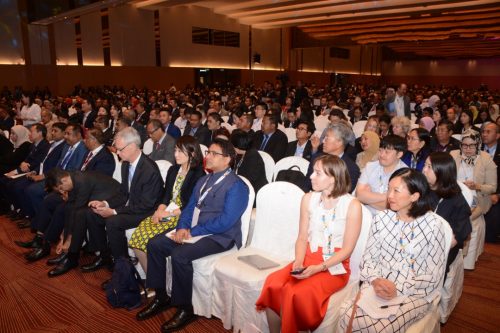
She said there were five key areas to look at to accelerate the implementation of SDGs.
“Firstly, is the financing for development. We need to provide sufficient financing for development in urban areas and cities.
“Secondly, is about youth. We understand that not every country has youth potentials.
“However, the youth potentials in our region are immense.
“Thirdly, women. Half of our population are women. We have to look at how can we leverage and empower women.
“Fourthly is about technology. Countries in our region are leaders in technology.
“We must look at how can we harness the potential of technology.
“Finally, good governance. It is important to build good governance and strong institutions,” she said.
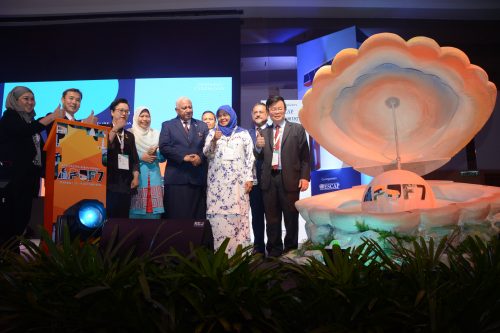
United Nations Under-Secretary-General and United Nations Human Settlements Programme (UN-Habitat) executive director Datuk Seri Maimunah Mohd Sharif said cities in Asia-Pacific are at the forefront of global efforts to achieve the SDGs by 2030.
“These cities serve as engines of economic prosperity, innovation and well-being.
“This forum is the largest regional urban forum to date, and the first to discuss local action. We are not only talking about declaration. We want to discuss actions at the local level to advance the implementation of SDGs and The New Urban Agenda.
“APUF-7 is a follow up of the World Urban Forum 9 (WUF9) in Kuala Lumpur last year and the Malaysia Urban Forum (MUF2019) held earlier this year,” she said.
The Republic of Fiji Prime Minister Josaia Voreqe Bainimarama said urban centres across the world are assuming a larger role in achieving the SDGs.
“This is particularly true with climate change. Cities around the world – over 90% of which are located on the coast – are naturally more vulnerable to catastrophic weather events.
“They have an outsized carbon footprint and their buildings and infrastructure trap heat, further intensifying the effects of global warming.
“However, when it comes to meeting any of our SDGs, we shouldn’t see our cities as the problem.
“They can be the solution with proper urban planning, innovation and local thinking,” he said in his speech.
Penang Island City Council mayor Datuk Yew Tung Seang said the forum was a good platform for everyone to share their experience and expertise.
“Penang started working towards becoming a low-carbon city about 10 years ago with the introduction of the first No Free Plastic Bags campaign in the country. The effort is followed by a ban on polystyrene in 2012 and now we are heading towards a total ban on single-use plastics by 2023.
“We have planted over 350,000 trees in Penang throughout the past 10 years. We plan to plant another 100,000 trees by 2023,” he said.
Chief Minister Chow Kon Yeow said while the forum focused on countries in the Asia-Pacific, countries outside the Asia-Pacific were also keen to take part in the forum.
“We have representatives from 60 countries attending this forum, out of which, 30 countries are within the Asia-Pacific region. I was told that there are about 7,000 delegates participating in the forum.
“APUF-7 is a good platform for every country to work together towards a common agenda, which is the transformative development through sustainable urbanisation,” he said.
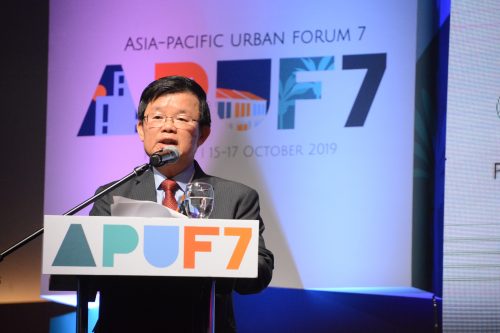
Chow also spoke on the Penang2030 vision – which is a call to stakeholders to participate and contribute in shaping Penang’s future towards a liveable and green city.
“Penang is well aware of the need to keep a balance between development and environmental protection. Over the years, we have implemented various sustainable initiatives under our Penang Green Agenda.
“Through the Penang Green Council (PGC), we have collaborated with various institutions to promote green activities, especially in schools and education institutions, so that the young can be involved in pushing the green agenda forward,” Chow said.
The opening of APUF-7 also saw the launching of The Future of Asian and Pacific Cities Report 2019 and the Penang Platform for Sustainable Urbanisation.
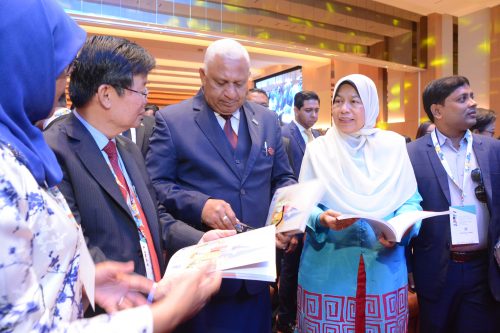
The Future of Asian and Pacific Cities Report 2019 is a major report that looks at the implementation of urban solutions across different cities under four critical development challenges – natural resources management, climate change, disaster risk and rising inequalities.
The Penang Platform for Sustainable Urbanisation is a platform for stakeholders and policymakers to declare their commitments towards a sustainable agenda. It is for each country to determine the time frame that they will implement their sustainable agendas, the funding that they will commit, the partners that they will work with and the potential projects and programmes that they hope to implement.
The APUF-7 is currently ongoing until Oct 17.
A festival, ‘Potpourri’, would be held at the Esplanade on Oct 17 from 4pm onwards.
It was reported that there will be cultural performances, projection mapping on the City Hall and plenty of street food for the public to enjoy.
Story by Christopher Tan
Pix by Law Suun Ting
Video by Ahmad Adil Muhamad

